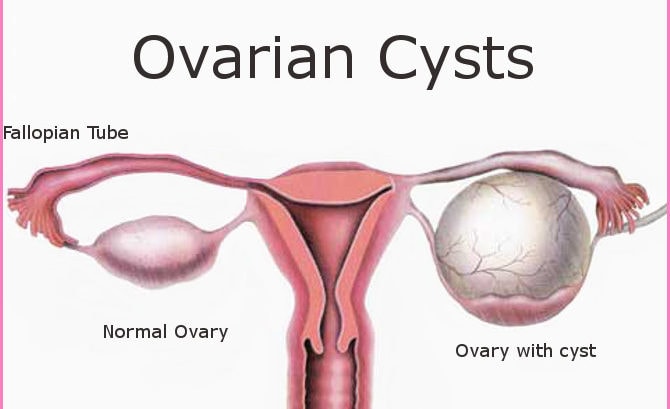Ovarian cysts
Ovarian cysts are fluid-filled sacs or pockets within or on the surface of an ovary. Women have two ovaries — each about the size and shape of an almond — located on each side of the uterus. Eggs (ova) develop and mature in the ovaries and are released in monthly cycles during your childbearing years.
Many women have ovarian cysts at some time during their lives. Most ovarian cysts present little or no discomfort and are harmless. The majority of ovarian cysts disappear without treatment within a few months.
However, ovarian cysts especially those that have ruptured sometimes produce serious symptoms.
Causes
Most ovarian cysts develop as a result of the normal function of your menstrual cycle. These are known as functional cysts. Other types of cysts are much less common.
Functional cysts
Your ovaries normally grow cyst-like structures called follicles each month. Follicles produce the hormones estrogen and progesterone and release an egg when you ovulate. Sometimes a normal monthly follicle keeps growing. When that happens, it is known as a functional cyst. There are two types of functional cysts:
- Follicular cyst.Around the midpoint of your menstrual cycle, an egg bursts out of its follicle and travels down the fallopian tube in search of sperm and fertilization. A follicular cyst begins when something goes wrong and the follicle doesn’t rupture or release its egg. Instead, it grows and turns into a cyst.
- Corpus luteum cyst.When a follicle releases its egg, the ruptured follicle begins producing large quantities of estrogen and progesterone for conception. This follicle is now called the corpus luteum. Sometimes, however, the escape opening of the egg seals off and fluid accumulates inside the follicle, causing the corpus luteum to expand into a cyst.
The fertility drug clomiphene (Clomid, Serophene), which is used to induce ovulation, increases the risk of a corpus luteum cyst developing after ovulation. These cysts don’t prevent or threaten a resulting pregnancy.
Functional cysts are usually harmless, rarely cause pain, and often disappear on their own within two or three menstrual cycles.
Other cysts
Some types of cysts are not related to the normal function of your menstrual cycle. These cysts include:
- Dermoid cysts.These cysts may contain tissue, such as hair, skin or teeth because they form from cells that produce human eggs. They are rarely cancerous.
- These cysts develop from ovarian tissue and may be filled with a watery liquid or a mucous material.
- These cysts develop as a result of endometriosis, a condition in which uterine endometrial cells grow outside your uterus. Some of that tissue may attach to your ovary and form a growth.
Dermoid cysts and cystadenomas can become large, causing the ovary to move out of its usual position in the pelvis. This increases the chance of painful twisting of your ovary, called ovarian torsion.
Symptoms
Most cysts don’t cause any symptoms and go away on their own. A large ovarian cyst can cause abdominal discomfort. If a large cyst presses on your bladder, you may feel the need to urinate more frequently because bladder capacity is reduced.
The signs and symptoms of ovarian cysts, if present, may include:
- Pelvic pain — a dull ache that may radiate to your lower back and thighs
- Pelvic pain shortly before your period begins or just before it ends
- Pelvic pain during intercourse (dyspareunia)
- Pain during bowel movements or pressure on your bowels
- Nausea, vomiting or breast tenderness like that experienced during pregnancy
- Fullness or heaviness in your abdomen
- Pressure on your bladder that causes you to urinate more frequently or have difficulty emptying your bladder completely
Homoeopathic Treatment
Homeopathy is very proficient in managing the symptoms of Ovarian Cyst and has an excellent success rate in homeopathic treatment for OVARIAN CYST.
Homeopathy is designed to be curative and not just palliative & suppressive.
Homeopathy has no side effects of hormonal therapies as in the conventional system of medicine.
Homeopathy is entirely noninvasive and painless.
Ovarian Cyst can prevent you from experiencing joy and bliss of motherhood. Let Homeopathy give you feeling of being a mother by controlling your Ovarian Cyst.
Since Homeopathy considers each case unique and treats patient and not merely Ovarian Cyst, it is the aptest field for treatment of Ovarian Cyst and is strongly recommended.
Homeopathy is holistic and does not support toxic suppression of any diseases.Homeopathic medicines are safe and hence can be easily administered.

